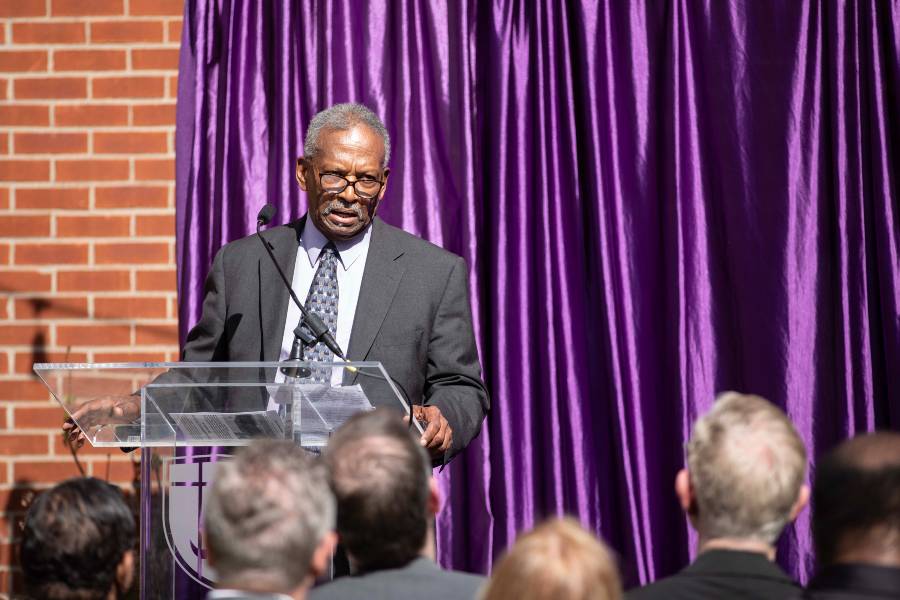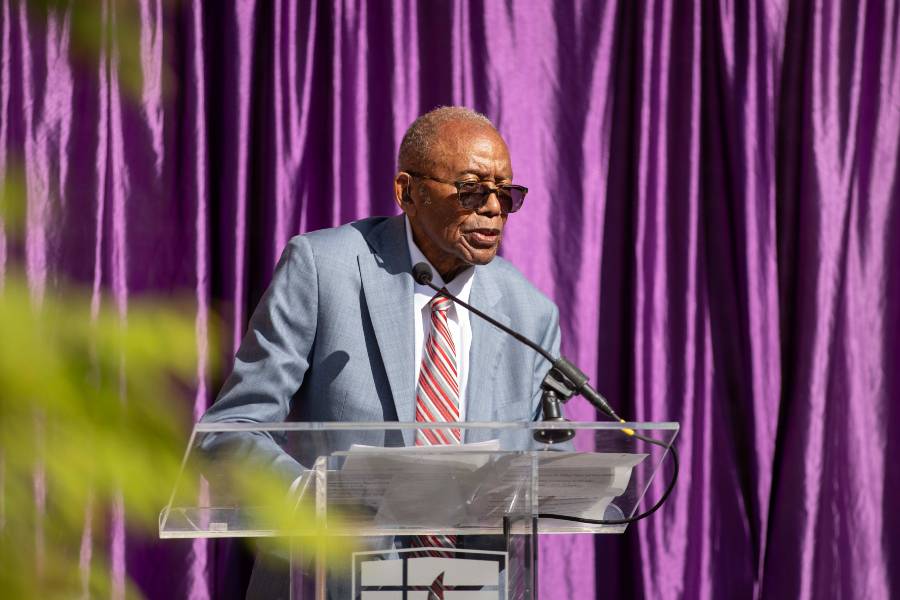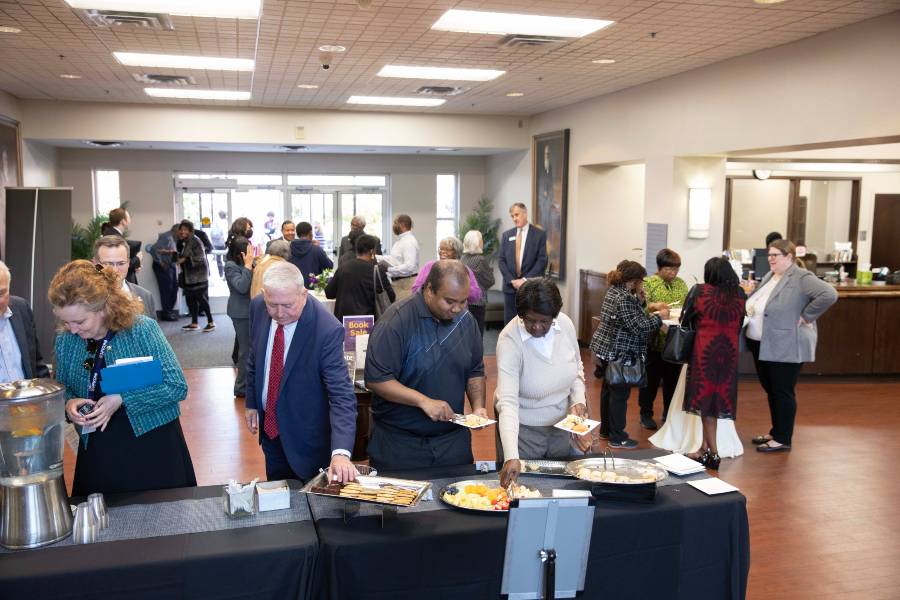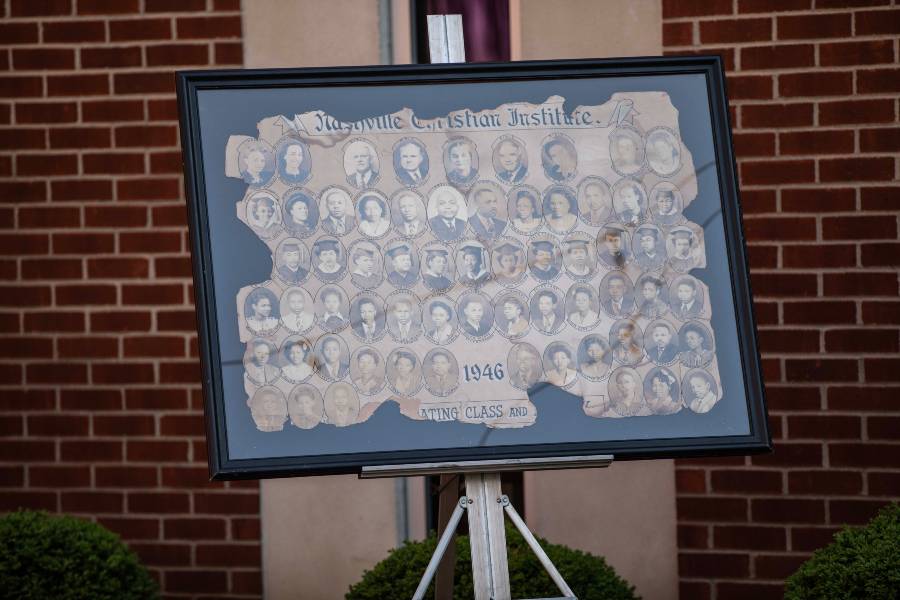Historical marker dedication celebrates impact of Nashville Christian Institute
The NCI and Lipscomb community gathered on April 1 to dedicate the new on-campus plaque honoring the legacy of the landmark school.
By Kim Chaudoin |

(l to r) Steve Joiner, dean of the College of Leadership & Public Service, Harry Kellum, head of the NCI Alumni Association and Lipscomb's first African American graduate in 1968, Fred Gray, NCI alumnus and iconic civil rights era attorney, and Candice McQueen, Lipscomb President, pose with a new plaque posted outside Beaman Library to honor the history of NCI.
Lipscomb University honored the legacy of the Nashville Christian Institute (NCI) at a special ceremony in the Mary Eddy Jones Courtyard at Beaman Library on April 1. The ceremony marked the unveiling of a historical marker placed at the original site of the school on 24th Avenue North as well as a replica plaque placed on Lipscomb’s campus.
The event brought together Lipscomb faculty and staff, members of the university’s Board of Trustees, alumni of NCI, and their family and friends to commemorate the significance of the school and its contributions to Christian education and civil rights history.
The ceremony included remarks from Lipscomb President Candice McQueen, NCI alumni Harry Kellam and renowned civil rights attorney Fred D. Gray, as well as William Turner, special counsel to the president, and Brent Culberson, vice president for community and government relations. A reception followed in the lobby of Beaman Library.

“It is a tremendous honor to welcome you to Lipscomb University today for this special moment in our shared history,” said McQueen in her opening remarks. “Today, we celebrate the legacy and impact of Nashville Christian Institute — a legacy of faith, of education and of leadership — as we dedicate a historical marker at the original location of the school and a replica marker on our campus.”
Founded in 1940, Nashville Christian Institute was a pivotal educational institution for African American students in the Churches of Christ tradition during a time of deep racial segregation. Initially offering night classes for working adults, the school expanded to include elementary and high school programs just two years later. More than 500 students were educated at NCI before its closure in 1967.
“The Nashville Christian Institute was more than a school,” said Turner. “It was a source of light and strength during a time when educational opportunity for African American students was limited, and societal barriers were great. NCI served as a vital center for the African American Church of Christ community — and became a launching point for those who would lead both churches and communities.”

The video screen showing the 24th Ave. N. city historical marker to those gathered at the on-campus April 1 ceremony.
Among the school’s most notable alumni is Gray, who served as legal counsel for Rosa Parks and Martin Luther King Jr., and was instrumental in landmark civil rights cases.
“My reflections as an alumnus of NCI are wholesome and positive,” said Gray. “It was a Christian education and a Christian environment. I am thankful. The unveiling of the NCI historic marker on both this campus and at the site of NCI on North 24th Street is meaningful to me in part because it provided young African Americans in this country an opportunity to go on and impact the world.”
Gray, who entered NCI in 1943 at the age of 13, recalled being recruited by Marshall Keeble, the school’s president and a leading evangelist in the Churches of Christ. Gray shared how Keeble would take young preachers on fundraising and recruiting trips across the South — trips that helped shape his calling and mission.

NCI and Lipscomb alumnus Harry Kellum speaks at the ceremony. Kellum heads the NCI Alumni Association whom Lipscomb partnered with for two memorial projects, the historical marker and a digital archive.
“Not only did I turn 94 years of age in December of last year, but my journey to become the person that I have become continued from Montgomery to Nashville, to NCI,” said Gray. “It was the first step in my becoming who I am today.”
Kellam, a 1963 graduate of NCI, shared his experiences as a student and highlighted the school’s rigorous biblical and public speaking curriculum.
“NCI was responsible for producing some of the most outstanding ministers,” said Kellam. “We also had successful alumni in many other fields — medicine, education, economics and public service. What set NCI apart was its foundation in Scripture and its commitment to excellence.”

Iconic civil rights era attorney and Lipscomb partner Fred D. Gray spoke at the ceremony. Gray is the namesake of Lipscomb's Fred D. Gray Institute for Law, Justice & Society.
Culberson, who led Lipscomb’s partnership with the Tennessee Historical Commission to secure the marker, shared the journey behind the project.
“This story began in the fall of 2023,” said Culberson. “We approached the Metropolitan Historical Commission at a time when the original site of NCI was listed among the nine most endangered historic places in Nashville. This marker now tells the story of a school that made a profound impact on this community and far beyond.”
“Now, we join with the Metropolitan Historical Commission in placing this historical marker at the original NCI site and a replica on our campus as physical reminders of the spiritual and educational legacy of the Nashville Christian Institute,” said McQueen. “May these markers serve to educate future generations about the tremendous contribution of the Nashville Christian Institute to Christian education, about its eternal impact on the lives of many and about the people through whom its legacy lives on today.”

A reception was held after the dedication ceremony in Beaman Library, which now hosts a digital archives of Nashville Christian Institute photos and documents.
NCI Digital Archives
In a separate project, the university’s Beaman Library has developed a digitized collection of NCI photos, letters, board minutes and student reflections — part of a growing partnership between Lipscomb and the NCI Alumni Association to preserve and share the school’s story.
Systems Librarian Jan Cohu and Electronic Resources Librarian Kayla Rutledge partnered with Kellum and members of the alumni association to add firsthand information and identifications to the photographs. The 250 documents in the archive include correspondence, school documents, NCI Board meeting minutes and legal documents. It also includes a series of written recollections by 16 NCI alumni on their first impressions and fond memories of the school as well as their lives after graduation.
The NCI archival documents can be viewed and downloaded at here.

Text on the On-Campus Historical Plaque
As a tribute to the legacy and impact of Nashville Christian Institute and its many alumni, Lipscomb University partnered with the Metropolitan-Nashville Historical Commission to place a historical marker at the original location of NCI. A replica of the historical marker is below and will forever be a part of Lipscomb's campus as a lasting memorial to our relationship.
Nashville Christian Institute
801 24th Ave. N.
A.C. Holt established Nashville Christian Institute in 1940 as a Church of Christ residential school for African American students. In 1942, the school became an elementary and high school offering a rigorous education rooted in the Bible. Dedicated faculty members including Holt, Marshall Keeble, Lucien Palmer and Willie Cato led NCI, educating more than 500 students, including civil rights attorney Fred D. Gray. The school closed in 1967.